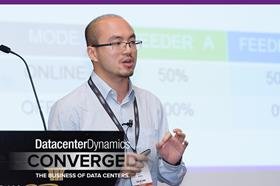Rather than focusing solely on technical specifications, organizations looking for an outsourced data centre in Indonesia should first ask themselves hard questions about the needs of their business, says Leo Chen, a senior architect at Alibaba Infrastructure Services.
Chen will discuss his ideas about data center site selection at the DCD>Indonesia conference held in Jakarta next month, but shared some of them with DCD before the event.
All about business requirements
“In the business world, technology is more to serve business development,” he said. In his eyes, the biggest mistake IT managers or CIOs can make when it comes to selecting an outsourced provider is a failure to adequately understand their own business and technical requirements. “What do you want to have in a data center for the business?” he asked.
Beyond that, it’s hard to be more specific, says Chen. Although there are many common mistakes made by CIOs when selecting a data center, the link to business requirements means there is no single answer. Outsiders are not privy to the myriad of considerations within a specific organization that can make “simple judgements” go badly wrong.
The emphasis on business requirements make sense, he explained, given that resolving technical problems is often a matter of investing sufficient resources to make things work. And Chen should know, as his role in data center design and solution development for the rapidly expanding Chinese cloud giant gives him a unique point of view that spans developed and developing cities around the world.
Start with core resources
Obviously, business needs aren’t the only deciding factor for organizations seeking a suitable outsourced provider. Chen ticked off four core resources that he says have a tremendous impact in terms of the cost: network, power, land and government policy. The latter includes government incentives or regulatory controls that have an impact on the data center, and will vary across countries or even regions.
“[Understand the] technical boundaries of the business need, network, location, space and power capacity. For example, financial clients look for abundant connectivity as well as latency to [their] end users. The public cloud data center has limitations on these as well [and] these tech boundaries will set limits to data center [selection],” noted Chen in a white paper on this topic.
The importance of the core resources explains why cities in tropical regions such as Singapore and Hong Kong have grown into thriving data centre hubs despite their inferiority from a power and cooling point of view
If anything, the importance of the core resources explains why cities in tropical regions such as Singapore and Hong Kong have grown into thriving data centre hubs despite their inherent inferiority from a power and cooling point of view. He wrote: “[Singapore and Hong Kong] have sufficient IT services market demand and rich connectivity, which is [a] core customer and market demand.”
And it is possible to leverage financing to rectify weaknesses in the core resources, according to Chen, who pointed to how giants such as KDDI, NTT and Equinix have relied on earthquake resistant facilities in Tokyo to mitigate the risks of being in an earthquake zone.
Closing in on Indonesia
In our earlier report on Indonesia last month, we put the spotlight on why Indonesia’s power issues cannot be resolved overnight. Broadly speaking, this is due to an existing country-wide undersupply, a poor electrification ratio and surging growth that continues to push the limits of the country’s power infrastructure despite a concerted government-led effort at building it up.
While Chen acknowledged that poor power does have an impact on operating costs, he also cautioned that it is hardly the only consideration. “The cost of a data center has so many attributes from hardware to personnel to resources provision. It is not easy to judge the whole cost from only power cost increase,” he said to DCD.
On the bright side, Chen pointed to how the lack of a robust power grid in India did not stop a “vast expansion of new data centers” on the subcontinent. Ultimately, he recommends that businesses adopt a risk management approach for a balanced evaluation.
“Global data center players [should seriously consider] risk management when selecting a site. Tenants should review their risk analysis report and compare to other Internet data center operators for further assessment,” he said.
Vendor selection
One suggestion offered in our earlier report titled “Should you build or outsource in Indonesia?” is the importance of vetting contracts with a fine-tooth comb before signing on the dotted line. According to Chen, it is also necessary to look at the financial health of an outsourced provider, and to ensure that they are capable of delivering what they promised.
Is data center your core business competitiveness? If not, outsourcing is better. If yes, how could you make it better than other market players?
“Ensure the outsourced data center provider has [the] four core resources. If they don’t enough power capacity and network connectivity, the data center makes no much sense,” said Chen. “The tenant should [also] review the financial capability and background of the outsourced data center provider. To see if they have the capital [and] funding to maintain sustainable… and generate positive revenues.”
The financial health of the outsourced provider is important due to the need to purchase equipment and services from a variety of vendors to keep their facility in tip-top shape, says Chen. An outsourced provider that uses non-standard components, for instance, could carry a higher risk as far as maintenance and availability of spare parts are concerned.
Due diligence not optional
While accreditations are easy to verify online, crucial components such as service, network connectivity, operation quality, facility design and engineering quality can only be reviewed onsite, said Chen. This needs to be validated with a site visit, though that can sometimes be entrusted to an external consultant.
Ideally, a workshop should be conducted with the sales engineer and operation manager to understand various aspects of the outsourced data center, says Chen. Among others, this should include learning about their “SOP (Standard Operating Procedure), MOP (Method of Procedure), building management systems (BMS), and looking at their maintenance documentation,” he said.
Though he acknowledged that accreditation matters, Chen noted that its absence does not necessarily disqualify an outsourced provider either. He said: “[Some] leading operators have their own global standards in designing, building and operating data centers. They have proven track records that [customers can trust].”
Finally, Chen has this to say to businesses still debating whether to go with an outsourced provider or to operate a self-managed data center: “Is data center your core business competitiveness? If not, outsourcing is better. If yes, how could you make it better than other market players?”


